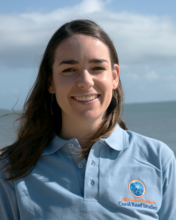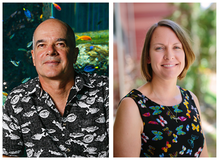Past Events
[Seminar] The neurobiological effects of ocean acidification on a cephalopod
2022-08-09Speaker: Jodi Thomas, ARC Centre of Excellence for Coral Reef Studies, James Cook University, Townsville, QLD Australia.
Hosted by: Professor Timothy Ravasi, OIST Marine Climate Change Unit
Abstract: The uptake of anthropogenic carbon dioxide (CO2) by the ocean is causing seawater CO2 levels to rise, changing ocean chemistry in a process known as ocean acidification (OA). OA can affect a variety of physiological processes, life history traits and behaviours of fish and marine invertebrates. As invertebrates comprise the vast majority of marine diversity, are essential for key ecosystem processes and support human livelihoods, OA-induced effects of marine invertebrates could have ecological, social and economic consequences.(...)
[Seminar] Rise of the turfs: the simplification of marine ecosystems under ocean acidification by Dr. Ben Harvey, Tsukuba University
2021-12-09Speaker: Dr. Ben P. Harvey, Assistant Professor at the Shimoda Marine Research Center, University of Tsukuba
Hosted by: Professor Timothy Ravasi, OIST Marine Climate Change Unit
Abstract: Human activities are rapidly changing the structure of coastal marine ecosystems, but the ecological consequences of these changes remain uncertain. Natural analogues of futuristic conditions are increasingly being used to assess the likely effects of rising atmospheric CO2 emissions on marine ecosystems. (...)
[Seminar] "Coral reef fish in a changing world: evolutionary potential and ecological limitations" by Philip L. Munday and Jennifer M. Donelson
2019-11-13[SEMINAR]
"Coral reef fish in a changing world: evolutionary potential and ecological limitations"
Philip L. Munday and Jennifer M. Donelson
ARC Centre of Excellence for Coral Reef Studies, James Cook University, Townsville, QLD Australia.
Many short-term experiments have demonstrated the potential impacts of ocean warming and acidification on marine organisms. However, longer-term experiments are needed to test the capacity for acclimation and adaptation to these stressors. In this talk we will describe unique multigenerational experiments being used to test the effects of warming and acidification on coral reef fishes and explore their capacity for thermal plasticity and adaptation.(...)
[Seminar] "Epigenetics for thermal plasticity in a reef fish" by Dr Taewoo Ryu, APEC Climate Center, Republic of Korea
2019-09-25Title: Epigenetics for thermal plasticity in a reef fish
Name: Taewoo Ryu
Affiliation: APEC Climate Center, Republic of Korea
Abstract:
Elevated ocean temperature exacerbates physiology and survival of many marine organisms. Recent studies showed that some species can fully restore the physiological traits either within one or after multiple generations depending on the populations. Uncovering cellular mechanisms of such phenotypic plasticity is important to understand and predict species’ or populations’ response to climate change. We tried to identify epigenetic mechanisms related to within- and transgenerational plasticity using the high and low latitude population of Great Barrier Reef fish, Acanthochromis Polyacanthus, which showed thermal acclimation at the first or second generations, respectively. By sequencing genome and DNA methylomes of fish reared in the control and future predicted temperatures (+1.5 and +3 °C) at the whole genome level, differentially methylated genomic regions and related genes were identified. Functions related to nutrient homeostasis, cardiovascular capacity, and development and were significantly enriched among differentially methylated genes of high latitude F1 population, which were scarcely enriched among those of low latitude F2 population, indicating highly coordinated regulation of these functions for within- compared to transgenerational plasticity.






